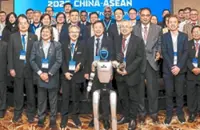AI will likely automate repetitive, time-consuming tasks, allowing employees to focus on higher value-added missions. — AFP Relaxnews
Many observers are harbouring the hope that generative artificial intelligence will make for major productivity gains. Two recently published studies support this theory, and even claim that these technologies could contribute to the widespread adoption of the four-day working week.
The papers were published by Autonomy, a think tank dedicated to tackling climate change, the future of work and economic planning. They analyse the effects of AI use on the British and American workforces, reporting that this technology could enable 28% of UK workers to see their working week cut from 40 to 32 hours by 2033. This means that they could easily complete their work tasks in four days, instead of five. And all for the same wage.





